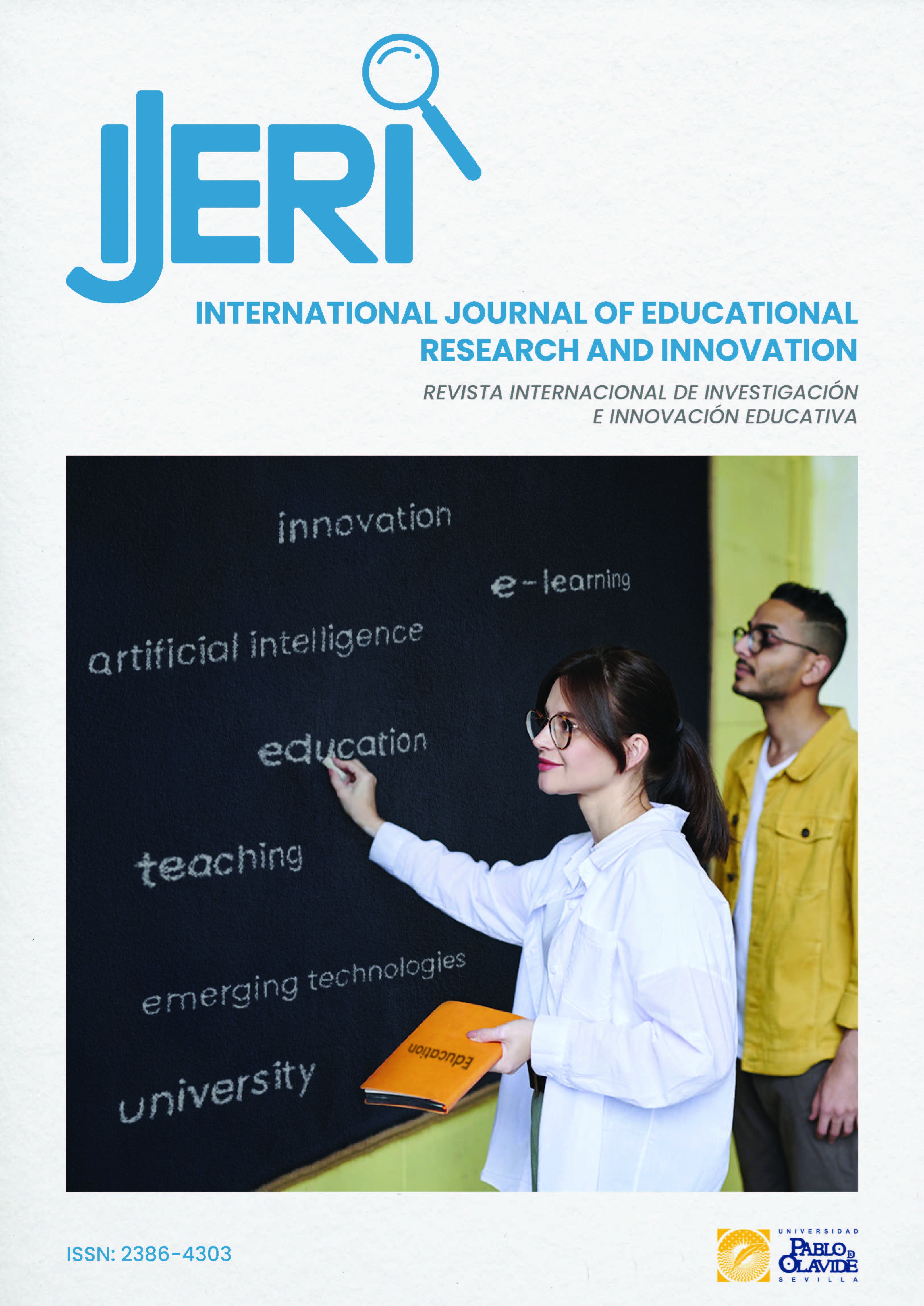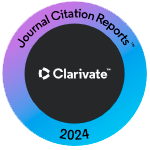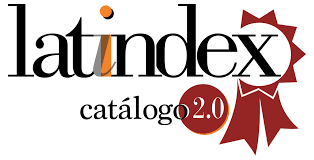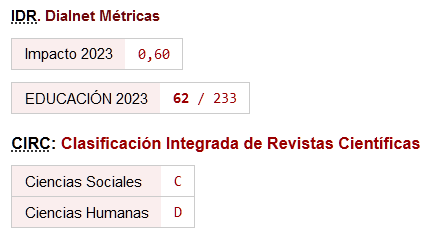Una revisión sistemática sobre la comunicación en la gamificación educativa
nuevos enfoques de investigación
DOI:
https://doi.org/10.46661/ijeri.8878Palabras clave:
Comunicación, gamificación, Educación Superior, TICResumen
Los autores de esta investigación exponen un estudio sobre la gamificación y los procesos de comunicación generados en diferentes contextos educativos. A través de una revisión sistemática, este trabajo descriptivo analiza un total de 80 artículos presentes en Web of Science (WoS) y SCOPUS siguiendo los criterios establecidos por el protocolo PRISMA. Los resultados muestran que la temática de estudio de investigación se encuentra en una etapa inicial, desprendiéndose cuatro bloques temáticos: motivación, experiencia, comunicación y mejora de habilidades. El valor de esta investigación radica en ofrecer una visión crítica basada en el desarrollo de un análisis en profundidad de la producción existente entre la gamificación y la comunicación en el ámbito educativo hasta la actualidad.
Descargas
Citas
Aksnes, D. & Sivertsen, G. (2019). A criteria-based assessment of the coverage of Scopus and Web of Science. Journal of Data and Information Science, 4(1), 1-21. https://doi.org/10.2478/jdis-2019-0001
Alba, B. (2021). Use of ICT and attention to diversity in times of COVID. Texto Livre – Linguagem e Tecnologia, 14(2). https://doi.org/10.35699/1983-3652.2021.33578
Alvarez, M., Bellido, M.D., & Atencia, P. (2019). Teaching though ICT in obligatory secondary education. Analysis of online teaching tools. RED-Revista de Educación a Distancia, 59. https://doi.org/10.6018/red/59/05
Asongu, S.A., & Odhiambo, N.M. (2019). Enhancing ICT for quality education in sub-Saharan Africa. Educacion and Information Technologies, 24(5), pp. 2823-2839. https://doi.org/10.1007/s10639-019-09880-9
Bicen, H., & Kocakoyun, S. (2020). Gamification Education for Parents: Effects on Motivation and Communication. Revista de Cercetare si Interventie Sociala, 69, 176-193. https://doi.org/10.33788/rcis.69.11
Bilro, R., Loureiro, S., & Angelino, F. (2021). The Role of Creative Communications and Gamification in Student Engagement in Higher Education: A Sentiment Analysis Approach. Journal of Creative Communications, 15. https://doi.org/10.1177%2F0973258621992644
Candel, E., & Agustin, M. (2020). ICT and aicle as facilitators in bilingual education. ARTSEDUCA, 25, 153-172. https://doi.org/10.6035/Artseduca.2020.25.11
Capasso, M., & Mark, M.S. (2021). The evolving economic employment of ICT education: the case of Norway. Sustainability, 13(15). https://doi.org/10.3390/su13158476
Carnicer, D., Loureiro, E., Manresa, J.M., Martinez, M., Avecilla, À., Montero, L., & Falguera, G. (2019). The Notijoves project: Protocol for a randomized controlled trial about new communication technologies and gamification to promote partner notification of sexually transmitted infections among young people. JMIR Res Protoc, 8(6). https://doi.org/10.2196/12896
Cavalcanti, J.; Valls, V.; Contero, M., & Fonseca, D. (2021). Gamification and Hazard Communication in Virtual Reality: A Qualitative Study. Sensors, 21, 4663. https://doi.org/10.3390/s21144663
De Arruda, R.L. & Nascimiento, R.N. (2021). Notes of the use of ICT in teaching remote: a study with teachers of Basic Education. DIALOGIA, 37. https://doi.org/10.5585/dialogia.n37.18144ICT
Demidov, A., Syrina, T., & Tretyakov, A. (2020). Development of digital skills and media education system: from the organization of environmental education of preschool children to the ICT competence of teachers. Media Educacion-Mediaobrazovanie, 1, 11-23. https://doi.org/10.13187/me.2020.1.11
Durao, N., Moreira, F., Ferreira, M.J., Pereira, C. S., & Annamalai, N. (2020). The state of mobile learning supported by gamification and augmented reality in higher education institutions across three continents. Revista edapeci-educacao a distancia e practicas educativas comunicationais e interculturais, 20(1), 130-147. https://doi.org/10.29276/redapeci.2020.20.112211.130-147
Forkosh, A., & Avidov, O. (2020). ICT implementation in colleges of education: a framework for teacher educators. Journal of Information Technology Education Research, 18, 207-229. https://doi.org/10.28945/4312
Gomez, J. (2020). Media education in the ICT era: theoretical structure for innovative teaching styles. Information, 11(5). https://doi.org/10.3390/info11050276
Goncalves, V., & Vaz, C.E.A. (2021). (Cyber)Bullying: systematic literature review. Revista Educaonline, 15(1), 192-214.
González, M.D., Abad, E., López, E., & Gomez, J. (2020). Managing ICT for Sustainable Education: Research Analysis in the Context of Higher Education. Sustainability, 12 (9). https://doi.org/10.3390/su12198254
Goodman, M., Carlson, D., Kyles, L., & Goodman, N. (2015). What gamification tells us about web communication. Media Watch, 6(2), 200-208. https://doi.org/10.15655/mw/2015/v6i2/65665
Gunduz, A.Y.., & Akkoyunlu, B. (2020). Effectiveness of gamification in flipped learning. Sage Open, 10(4). https://doi.org/10.1177/2158244020979837
Hsiu, L., & Hsi-Hsun, Y. (2020). Incorporating gamification into website design to facilitate effective communication. Theoretical Issues in Ergonomics Science, 21(1), 89-111. https://doi.org/10.1080/1463922X.2019.1645920
Jinu, R., & Beegum, S.S. (2019). Nitro type: Cascading information through gamification to enhance the communication skills of learners. JARDCS, 11(11), 808-815. http://doi.org/10.5373/JARDCS/V11SP11/20193100
Jurado, P., Moreno, A. J., Marín, J.A. & Soler, R. (2020). The term equity in education: a literature review with scientific mapping in Web of Science. International Journal of Environmental Research and Public Health, 17, 1-17. https://doi.org/10.3390/ijerph17103526
Kerzic, D., Danko, M., Zorko V., & Decman, M. (2021). The effect of age on higher education teachers’ ICT use. Knowledge Management & E-Learning-An International Journal, 13(2), 182-193. https://doi.org/10.34105/j.kmel.2021.13.010
Lim, C.P., Ra, S., Chin, B., & Wang, T.C. (2020). Information and communication technologies (ICT) for access to quality education in the global south: A case study of Sri Lanka. Education and Information Technologies, 25(4), 2447-2562. https://doi.org/10.1007/s10639-019-10069-3
Lindberg, L., Fields, D., & Kafai, Y. (2020). STEAM Maker education: conceal/reveal of personal, artistic and computational dimensions in high school students projects. Frontiers in Education, 5. https://doi.org/10.3389/feduc.2020.00051
Liu, Liu, X., and Zhang, W. (2020). Diversities of learners’ interactions in different MOOC courses: how these diversities affects communication in learning. Computers & Education, 151, 103873. https://doi.org/10.1016/j.compedu.2020.103873
López, J., Moreno, A.J., López, J. & Pozo, S. (2019). Analysis of the productive, structural and dynamic development of Augmented Reality in Higher Education research on the Web of Science. Applied Science, 9, 1-21. https://doi.org/10.3390/app9245306
Lorente, L.M., Arrabal, A.A., & Pulido, C. (2020). The right to education and ICT during COVID-19: An international perspective. Sustainability, 12(21). https://doi.org/10.3390/su12219091
Martínez, P. D. & Toscano, A. (2021). Gamification for the training of the professionals in information sciences through information and communication technologies. Conrado, 17(81), 7-16.
Masoumi, D. (2020). Situating ICT in early childhood teacher education. Education and Information Technologies, 26(3), 3009-3026. https://doi.org/10.1007/s10639-020-10399-7
Mielikainen, M. (2021). Towards blended learning: takeholders’ perspectives on a project-based integrated curriculum in ICT engineering education. Industry and Higher Education, 36(1), 74-85. https://doi.org/10.1177/0950422221994471
Moher D., Liberati A., Tetzlaff J., & Altman D.G. (2009). Preferred reporting ítems for systematic reviews and meta-analysis: The Prisma statement. Journal of Clinical Epidemiology, 62(10). https://doi.org/10.1136/bmj.b2535
Nwankwo, W., & Njoku, C.C. (2020). Sustainable development in developing societies the place of ICT-driven computer education. International Journal of Emerging Technologies in Learning, 15(2), 290-297. https://doi.org/10.3991/ijet.v15i12.14007
Osipov, I. V., Volinsky, A. A., Nikulchev, E., & Prasikova, A. Y. (2016). Communication and Gamification in the Web-Based Foreign Language Educational System: Web-Based Foreign Language Educational System. International Journal of Web-Based Learning and Teaching Technologies (IJWLTT), 11(4), 22-34. http://doi.org/10.4018/IJWLTT.2016100102
Paglinawan, W. (2020). University Students Engagement With And Disengagement From Fake News. Media Literacy and Academy Research, 3(2), 77-87.
Pascagaza, E.F. & Estrada, L.C. (2020) Modernization of virtual education and its incidence in the context of Information and Communication Technologies (ICT). Academia y Virtualidad, 13(2), 103--16. https://doi.org/10.18359/ravi.4724
Reitz, L., Sohny, A., & Lochmann, G. (2016). VR-based gamification of communication training and oral examination in a second language. International Journal of Game-Based Learning, 6(2), 46-61. https://doi.org/10.4018/IJGBL.2016040104
Rodríguez, A., Moreno, A., & López, J. (2020). Nomophobia: an individual’s growing fear of being without a Smartphone – a systematic literatura review. International Journal of Environmental Research and Public Health, 17. https://doi.org/10.3390/ijerph17020580
Shapalova, E. (2020). Improving Media Education as a Way to Combat Fake News. Media Education (Mediaobrazovanie), 60(4), 730-735. https://doi.org/10.13187/me.2020.4.730
Shmakova, A., Ryzhova, Y., & Suhrukhih, A. (2021). The impact of ICT education on humanistic innovative potential. Education and Information Technologies, 27, 2267-2282. https://doi.org/10.1007/s10639-021-10674-1
Siepmann, C., & Kowalczuk, P. (2021). Understanding continued smartwatch usage: the role of emotional as well as health and fitness factors. Electronic Markets, 31, 795-809. https://doi.org/10.1007/s12525-021-00458-3
Soler, R., Lafarga, P., Mauri, M., & Moreno, A.J. (2021). Netiquette: ethic, education, and behavior on Internet – A systematic literature review. International Journal of Environmental Research and Public Health, 18(3). https://doi.org/10.3390/ijerph18031212
Spates, S. A. (2021). The Bear Cave: Using gamification to teach organizational communication. Communication Teacher. 36(2), 160-165. https://doi.org/10.1080/17404622.2021.1937665
Tam, H.L., Chan, A.Y.F., & Lai, O.L.H. (2021). Gender stereotyping and STEM education: girls’ empowerment through effective ICT training in Hong Kong. Children and Youth Services Review. https://doi.org/10.1016/j.childyouth.2020.105624
Terron, A.M., Olivencia, J.J.L, & Caballero, P.D. (2020). Big Data irruption in education. PIXEL-BIT-Revista de medios y comunicación, 57, 59-90. https://doi.org/10.12795/pixelbit.2020.i57.02
Tinmaz, H., & Ozturk, Y.E. (2019). ICT integration into education: a comparison of South Korea and Turkey. Perspective on global development and technology, 18(4), 422-456. https://doi.org/10.1163/15691497-12341527
Torres, M., Ponce, F., & Gallegos, J. (2021). ICT as generators of social exclusion in university educational practices. Contextos Educativos – Revista de Educación, 27, 205-221. https://doi.org/10.18172/con.4566
Torres, M.P. (2022). ICT in higher education to solvent a health crisis. Etic net-revista científica electrónica de educación y comunicación en la sociedad del conocimiento, 21(2), 451-472. https://doi.org/10.30827/eticanet.v21i2.21780
Vaterlaus, J., Aylward, A., Tarabochia, D., & Martin, J. (2021). “A Smartphone made my life easier”: An exploratory study on age of adolescent Smartphone acquisition and well-being. Computers in Human Behavior, 114. https://doi.org/10.1016/j.chb.2020.106563
Veltsos, J.R. (2017). Gamification in the Business Communication Course. Business and Professional Communication Quarterly, 80(2), 194-216. https://doi.org/10.1177%2F2329490616676576
Zanotti, A., & Grasso, M. (2020). Innovative ICT experiences in non-formal education. Question, 1(65). https://doi.org/10.24215/16696581e261
Publicado
Cómo citar
Número
Sección
Licencia
Derechos de autor 2024 Pablo Lafarga Ostáriz, Rebeca Soler Costa, Luis del Barrio Aranda, María Pilar Cáceres Reche

Esta obra está bajo una licencia internacional Creative Commons Atribución-NoComercial-SinDerivadas 4.0.











